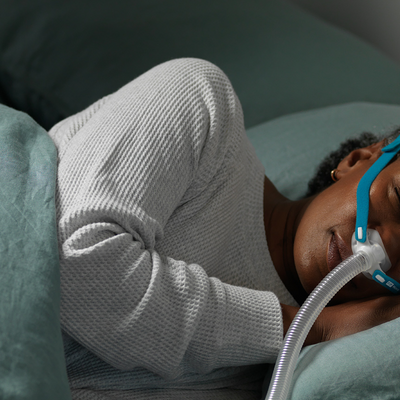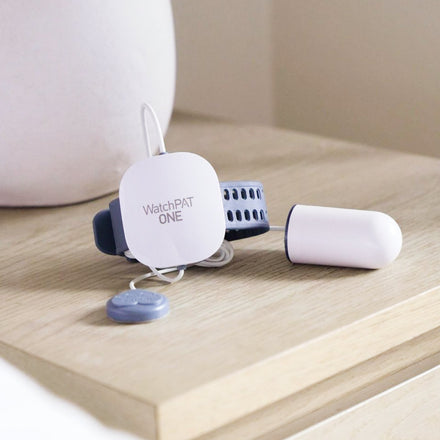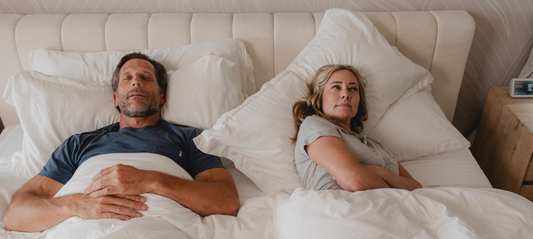When you live with diabetes, you live with numbers. Blood sugar levels. Medication dosages. Eating times. Carb intake. Minutes of physical activity.
As a diabetic, you are an expert at quantifying your day.
When you live with sleep apnea and diabetes, working through the numbers becomes more complicated. Sleep apnea reduces your sleep quality, so you wake up feeling tired and groggy — and less likely to effectively manage your diabetes routine.
Can Sleep Apnea Cause Diabetes?
Diabetes and sleep apnea are connected. People with sleep apnea — specifically, OSA — are more likely to develop diabetes, regardless of age and BMI level. And among people with more severe OSA, there is a higher rate of type 2 diabetes. In fact, almost 30% of people with severe OSA also have type 2 diabetes.
This is not to say that sleep apnea causes diabetes, but the correlation is clear: the majority of people with diabetes also have sleep apnea. And the more severe your sleep apnea, the more likely your chances of developing type 2 diabetes.
Obstructive sleep apnea and diabetes are a tag-team villain to your long-term health: when either goes untreated, both wreak havoc on your body.
Sleep and Insulin — What’s the Connection?
As the most common form of sleep apnea, OSA occurs when the upper airways narrow or close off completely as you sleep. As a result, your body wakes up — manifested as a choke, snore, or gasp — to restart your breathing. The disrupted cycles of breathing lead to increased carbon dioxide and decreased oxygen levels in the blood, as well as fragmented and shortened sleep times — all of which could impact your body’s sensitivity to insulin.
Insulin is the hormone that regulates sugar (glucose) levels in the blood. High insulin sensitivity means that the body’s cells absorb glucose more effectively, reducing the amount of sugar in your bloodstream. Low insulin sensitivity, known as insulin resistance, means the opposite: the body’s cells absorb less glucose, causing sugar to build up in your bloodstream. An increase in blood glucose levels puts you at greater risk for developing diabetes.
Here’s the connection between sleep and insulin: shortened sleep time, generally considered six hours or less of sleep, changes your body’s glucose metabolism by increasing insulin resistance and thereby reducing glucose tolerance. Fragmented sleep, which disrupts your normal sleep cycle, also impairs insulin resistance.
While it’s not clear how shortened or fragmented sleep directly impact glucose metabolism in the body, both sleep factors — which are inherent in OSA — are associated with an increased risk of type 2 diabetes.
What’s more, the harmful effects of OSA aren’t limited to sleep time; they also exacerbate diabetes when you’re awake. Excessive sleepiness during the day, a result of poor sleep, could also modify insulin resistance. Whether you’re awake or asleep, sleep apnea negatively affects the ways your body functions.
The Link Between Sleep Apnea and Diabetes
As we’ve covered, OSA reduces sleep time and quality and increases the risk of developing diabetes. On the contrary, treating sleep apnea leads to better health outcomes — including improved likelihood of preventing and managing diabetes.
The domino effect of sleep apnea looks like this: if you are diagnosed with sleep apnea and don’t treat it, you are more likely to develop diabetes. And if you already have diabetes and sleep apnea, you could experience greater challenges with managing your diabetes. After all, inadequate sleep can lower your motivation to manage meals, exercises, and medication.
On the upside, if you do treat your sleep apnea, you can reduce your risk of developing diabetes. And if you have sleep apnea and diabetes, OSA treatment can improve the energy, focus, and motivation you need to maintain your management plan.
The diabetes and sleep apnea connection points to clear-cut next steps. If you have diabetes, it’s imperative that you also find out if you have sleep apnea. And if you are diagnosed with OSA, it’s imperative that you treat it.
This is where Lofta comes in. Lofta provides home sleep tests that will track your sleep, give you a diagnosis, and set you up with a treatment plan.
With support from Lofta, you can go from diagnosis to treatment without leaving home. All it takes is signing up for a Lofta home sleep test today.

















